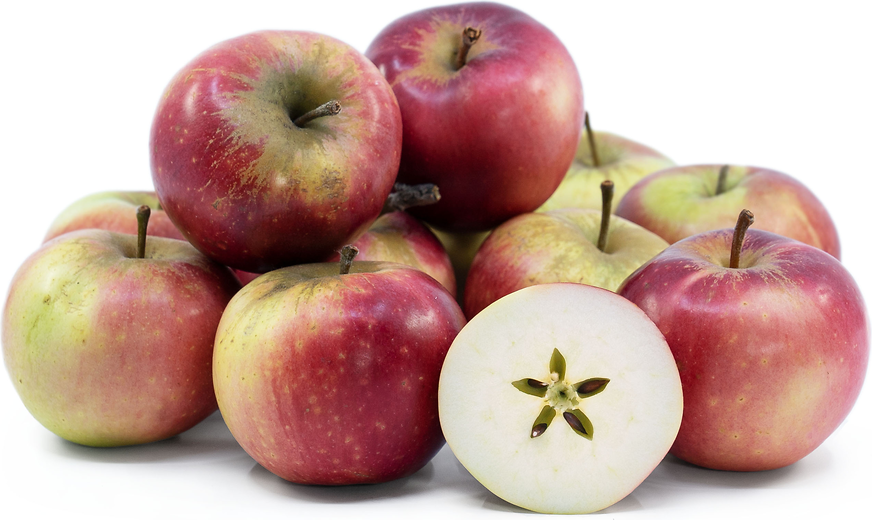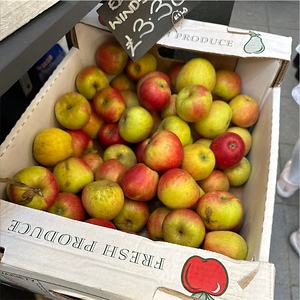


Alkmene Apples
Estimated Inventory, 1 Lb : 0
Description/Taste
Alkmene apples are a medium to large varietal, averaging 6 to 8 centimeters in diameter, and have a somewhat uniform ovate, round, to conical shape with a short, fibrous green-brown stem. The apple’s skin has a bright yellow hue, sometimes tinged with green, and is almost entirely covered in vibrant to dark red patches of blush, striping, and striations. The skin is also smooth, enveloped in a sticky layer of wax, and there are prominent tan lenticels scattered across the surface along with a ring of russet surrounding the stem. Underneath the surface, the ivory to yellow flesh is fine-grained, aqueous, and dense with a firm, chewy, and crunchy consistency. The flesh also encases a central core filled with tiny black-brown seeds. Alkmene apples have a subtle aroma reminiscent of apple juice and balanced sugar and acidity levels, contributing to a sweet, tart, and pleasantly tangy flavor with a honeyed aftertaste.
Seasons/Availability
Alkmene apples are available in the early fall through winter.
Current Facts
Alkmene apples, botanically classified as Malus domestica, are an early to mid-season variety belonging to the Rosaceae family. The sweet-tart apple was created in Germany just before World War II, selected for its hardiness and vigor compared to other early apple varieties, and was released to the public after the war. Alkmene apples initially found their home in German gardens, primarily consumed as a fresh-eating apple, but over time, the variety was also introduced to other parts of Europe and England, where the apple became multi-purpose. In England, Alkmene apples are known as Early Windsor apples, a name given in the 1990s as a part of a marketing rebranding to increase consumer appeal among English markets. The newly named variety was well-received due to its compact tree size, self-fertile nature, and heavy cropping, eventually being given the Award of Garden Merit in 1998 by the Royal Horticultural Society. This prestigious award is given to cultivars with outstanding growth characteristics for English gardening and has assisted in establishing Alkmene apples as a specialty home variety.
Nutritional Value
Alkmene apples are a good source of vitamin C to strengthen the immune system, reduce inflammation, and boost collagen production within the skin. The apples also provide vitamin E to protect cells against free radical damage, vitamin A to maintain healthy organ functioning, potassium to balance fluid levels within the body, and fiber to regulate the digestive tract. Beyond their primary nutrients, Alkmene apples contain lower amounts of calcium, iron, copper, zinc, and phosphorus.
Applications
Alkmene apples have a balanced, sweet-tart flavor well suited for fresh and cooked preparations. The apples can be eaten with or without the skin, depending on preference, and are popularly consumed raw as a dessert variety. Alkmene apples can also be chopped and tossed into green salads, shredded and mixed into slaws, sliced and dipped into chocolate or peanut butter as a snack, incorporated into grain bowls, or blended into smoothies as a refreshing additive. In addition to raw preparations, Alkmene apples are used throughout Germany as filling for pies, crumbles, strudels, and turnovers. The apples can be hollowed, stuffed with dried fruits and nuts, and baked, sliced into rings, battered, and fried, baked into bread pudding, or cooked into apple pancakes. Alkmene apples can also be simmered into applesauce, jams, chutney, and compotes. Beyond culinary dishes, the variety is sometimes used as a base flavoring in ciders and fresh-pressed juices. Alkmene apples pair well with meats such as roast duck, pork, lamb, and turkey, dried fruits including raisins, cherries, and cranberries, maple syrup, vanilla, lemon zest, spices such as nutmeg, allspice, and cinnamon, and nuts including walnuts, pine, and pecans. Whole, unwashed Alkmene apples will only keep 2 to 3 weeks when stored in the refrigerator. It is recommended to consume the apples immediately after harvest for the best quality and flavor.
Ethnic/Cultural Info
Alkmene apples have generated several sports that have become commercially viable varieties. The most well-known sport was initially known as Red Alkmene, discovered on a tree in Herefordshire in 1985 and later propagated in Suckley, Worcestershire, in 1993. The sport has a darker red skin coloring than the original cultivar, and its name was changed to Red Windsor for marketing purposes. Later, the name was changed again in 1998 when a contest was held for United Kingdom schools to rename the apples. The name Sweet Lilibet was selected in place of Red Alkmene and Red Windsor, and in many commercial markets in the present day, Sweet Lilibet apple is the principal label used for the variety. Another sport produced from Alkmene apples is known as Ceval, sometimes spelled Ceeval and Cevaal. This sport was found in The Netherlands in 1982.
Geography/History
Alkmene apples are native to Muncheberg, Germany, and were first bred in the mid-1930s by H. Murawski and M. Schmidt. The variety was developed from a cross between cox’s orange pippin apples and duchess of oldenburg apples and was created at the Kaiser Wilhelm Institute for Plant Breeding Research, now known as Max Planck Institute for Plant Breeding Research in the modern-day. Alkmene apples were the product of an initiative to breed an improved cox’s orange apple type with better resistance to disease and the ability to be grown in drier climates. The variety was one of the first apples bred at the Kaiser Wilhelm Institute. Alkmene apples were not released commercially until the 1960s due to World War II, but they became a popular home garden cultivar throughout Germany after their introduction. The variety was also brought to England, renamed Early Windsor in the mid-1990s to increase the cultivar’s appeal. Today Alkmene apples are commercially grown on a small scale in Germany, England, The Netherlands, and Belgium. When in season, the apples are mainly found in private orchards and home gardens.
Recipe Ideas
Recipes that include Alkmene Apples. One
| Black Belt Protein |
|
Apple Pie Cups with Blackberries |








